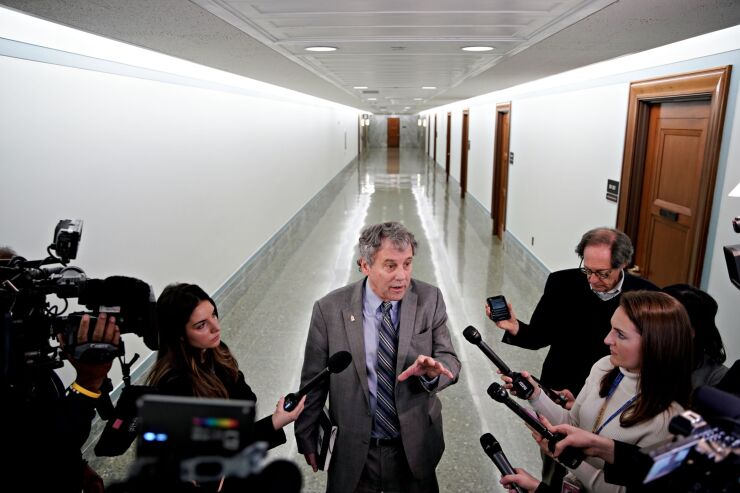
WASHINGTON — Chairman of the Senate Banking Committee Sen. Sherrod Brown, D-Ohio, is pressing the banks, fintechs and investors associated with Synapse to make whole customers who have money locked up in the fintech middleman's bankruptcy.
Millions of dollars are frozen in the bankruptcy of Synapse, which linked fintech firms like Yotta and Juno to banks like Evolve.
The bankruptcy case, which is ongoing, has uncovered that Synapse's ledgers include significant shortfalls between what consumers are owned and the funds held on their behalf by Synapse's partner banks. This makes unfreezing customer funds and restoring access to those accounts complicated, and likely will take a long time.
Brown, along with Democratic Sens. Ron Wyden of Oregon, John Fetterman of Pennsylvania and Tammy Baldwin of Wisconsin, told the major players in the Synapse debacle
"These developments are both deeply troubling and completely unacceptable," the lawmakers said in the letter. "In due time we will find out who is ultimately responsible for this mess, but in the interim, the priority must be to restore consumers' access to all of their money."
The lawmakers sent the letter to Synapse's investors — including Adreesen Horowitz, Trinity Ventures and Core Innovation Capital — and the banks connected to the fintech middleman, including Evolve, American Bank, Trust and Lineage Bank and AMG National Trust.
Former Synapse CEO Sankaet Pathak, along with the fintech apps partnered with Synapse including Copper, Juno, Mercury, Yieldstreet and Yotta also received the letter from the lawmakers.
Ironing out which entity owes consumers what money is likely to take time in bankruptcy court, given the shortfalls and complicated business ledgers that came
In the meantime, customers who have money frozen in the case have found themselves navigating Washington's gauntlet of banking agencies trying to figure out what recourse they have to retrieve their funds — a process that in the event of a bank failure, is typically not a problem because of the Federal Deposit Insurance Corp.'s resolution process.
"The Synapse bankruptcy has exposed the inherent weaknesses of this tri-party business model and caused hardworking Americans and small businesses to be deprived access to their own money," the lawmakers said in the letter.
The fintech apps that used Synapse to partner with banks often presented the deposits consumers placed in their apps as FDIC insured, a claim that applies only if the bank in question fails — not if the fintech or any of the companies it uses to bridge between the bank and the customer-facing app fail.
"Each of you is responsible for the customers who have been frozen out of their accounts," the lawmakers said. "Consumer-facing fintech firms marketed their products to the public as safe, reliable alternatives to banks. Because of those promises, consumers adopted their products and made deposits through their apps and websites."
The firms that funded Synapse, which include some of the largest venture capital firms in the crypto and fintech space, are also to blame, the lawmakers said.
"Venture capital firms funded Synapse without insisting on adequate controls to protect consumers," they said. "They stood to profit while Synapse billed itself as a trustworthy financial infrastructure provider. But they failed to make sure that Synapse could follow through on its commitments."
And the banks "made it possible for Synapse to market services ultimately provided by the banks," according to the letter.





